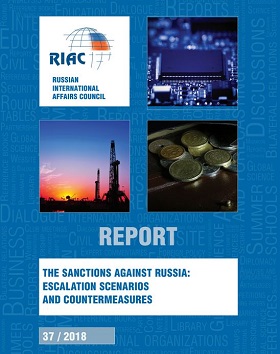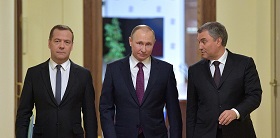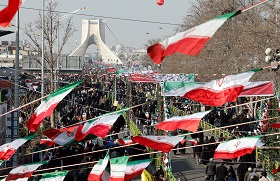The US sanctions against Russia have become habitual background news. As in wartime, people get used to daily bombing attacks, so at this point, news on the sanctions will only surprise the few that haven’t been paying attention. However, what US legislators and officials declared in August will have serious repercussions, at least on the stock markets. Russia’s expert community has split into “defeatists” and “protectionists.” The former are gloating: At last, they are going to show “us” what’s what, we’ve really done it. The latter are enthusiastic and brimming with optimism: They are attacking us, but we are all the stronger for it. But, in all evidence, the real state of affairs is in a different system of coordinates. Despite the economic inequality between the US and Russia, Moscow retains enough leverage to influence and control the situation. More than that, Washington’s increased radicalism is something that gives Russian diplomacy even more room to maneuver.
The US’s latest initiatives continue the trend of escalating and intensifying the sanctions. The new documents directly refer to Russia as an aggressor and adversary not unlike the DPRK, Syria and even ISIS. Russian political leaders are the embodiment of evil and existential threat to the “free world.” the title of the new US bill — Defending American Security from Kremlin Aggression Act (DASKAA) — speaks for itself. The new initiative mostly amplifies and supplements the existing law, PL 115-44 (CAATSA). But the new line of attack is specific in its own way.
First, DASKAA expands Art. 241 of CAATSA directed against “Russian oligarchs” and the Russian leader’s entourage. Now it is mandatory for the US president not only to identify the “inner circle” but also to impose on these people and organizations personal sanctions. True, it mentions only those involved in corruption, but the experience with the “Kremlin report” in early 2018 indicates that the black lists remain open for anyone. If DASKAA is signed into law, the “Kremlin report” needs to be updated based on the available information. CAATSA requirements restricting investment in and opportunities for privatizing Russian government assets are retained and made harsher. The bill spells out the need to draft a report on the Russian president’s personal assets and property. In other words, it is creating a narrative directed at eroding the legitimacy of the Russian political system.
Second, the bill steps up sanctions against the Russian energy sector. It envisages sanctions against Russian energy projects outside Russia and, what’s more important, against individuals and companies that invest in Russian oil production or that supply the goods, technologies, investment or services needed for crude oil extraction. In effect, this is an almost complete US economic blockade of the Russian oil industry.
Third, the bill makes it mandatory for the US president to draft a procedure banning US nationals and entities from being involved in operations related to Russian sovereign debt. While CAATSA committed the US Department of the Treasury to provide an analysis of the feasibility of these bans (the USDT responded that they were counterproductive and could affect US interests), DASKAA leaves the US executive branch with no choice in the matter.
Fourth, the bill puts much more focus on the digital space. The sanctions it suggests include penalties for cooperating with any Russian company that even theoretically is capable of hostile actions in the digital space. By and large, any company in the Russian IT sector is a candidate for falling under this heading.
Fifth, DASKAA directly accuses Russia of using chemical weapons. That Russia is to blame for poisoning the Skripals is taken as an axiom (although the official investigation has not revealed any specific conclusion). In addition, Russia is blamed for obstructing the investigation into chemical incidents in Syria. The bill requires penalties against Russia via diplomatic isolation, sanctions, and measures provided under the Chemical Weapons Convention. Among other things, these sanctions can be imposed based on the Chemical and Biological Weapons Control and Warfare Elimination Act of 1991 (PL 102-182).
The US Department of State preempted DASKAA’s approval by announcing that PL 102-182 would be in use starting in August 2018. The law stipulates that consultations can be held with a country whose citizens are suspected of using WMD within 90 days, after which sanctions may be imposed on them, including limitation of aid programs (irrelevant for Russia), limitation of arms sales (irrelevant), refusal to issue credit (likely to affect the financial sector, although the market has absorbed the damage from the existing financial sanctions), a ban on double-purpose exports (also nothing new), and trade limitations (Russian-US trade is insignificant as it is). Other proposed steps are lowering the level of diplomatic representation (relations have been curtailed but there is still the potential for escalation) and suspending the target country’s air flights to the US.
Generally, DASKAA is to reinforce the Department of State’s efficiency in applying the sanctions. Among other things, the bill suggests auditing public diplomacy programs, establishing an office for the digital space and digital economy and an Office of Sanctions Coordination within the State Department, as well as other measures. If the bill is signed into law, the Secretary of State will be in a position to put Russia in the category of countries that sponsor terrorism. There is no doubt that the Americans will find some formal pretexts for doing so. But this would be the end of American-Russian relations. Russia itself is a major target for international terrorism and an active fighter against the terrorist threat. Classifying Russia as an actual terrorist threat could have unpredictable consequences.
It would seem that DASKAA is indeed generating “draconian sanctions.” From the documentary point of view, this is so. But the key question is how effective the new sanctions will be. Clearly, Moscow will not be sitting on its hands. For all the issues in the national economy, Russia is a major power that can adapt to the sanctions and even isolate the Americans as they attempt to stifle their adversary. How can this be done?
First, the new sanctions are mostly a consequence of a domestic political divide and political struggles in the United States itself rather than strictly anything Moscow has done. There have been no fundamental changes in Russian foreign policy, but the sanctions are being tightened. Interference allegations can still pique the US public, but many analysts are fed up with and even skeptical of them. There are still many unanswered questions related to both the Skripal case and the incidents in Syria. But the Americans are rushing the sanctions and thereby provoking further aggravation in US-Russian relations. Against this background, the EU has adopted an extremely even-handed and cautious stance. Brussels will not accept the outcome of the Ukrainian crisis, nor give up sanctions on the Ukrainian package, as long as there is no peace in Donbass. However, Brussels is in no hurry to fan tension on other less clear issues. The EU is defending its own interests and realizes that new animosity in relations with Russia will be excessive and counterproductive. Symptomatically, DASKAA has an entire section requiring the administration to coordinate sanctions with the EU. Washington is fully aware that the efficiency of this will be low unless the allies take concerted action.
Second, the US has soiled its reputation by walking out on the nuclear agreement (JCPOA) with Iran. Iran has not breached its terms, but the US is withdrawing from it and much of the reason for that is again over domestic political considerations. Moreover, they are reviving the exterritorial sanctions against the Iranian energy sector, something that has been denounced by the EU, China and Russia. The US is isolated in this respect and this is likely to undermine the effectiveness of sanctions against Tehran. There is no doubt that Moscow is taking the Iranian experience into account.
Third, Moscow is active in minimizing the damage of the sanctions by diversifying trade, creating more autonomous financial instruments and building up the public sector. The sanctions are certainly slowing economic growth and public-sector companies typically do not offer greater efficiency than private companies. But at this point it is more difficult to cause severe economic discord in Russia through the use of sanctions. The real threat in this regard is more likely the ill health of the oil and gas markets than the restrictions.
Russia could also resort to what at first glance looks like unconventional moves. After Ukrainian elections, for example, Moscow could pursue exclusive cooperation with Brussels and achieve progress in implementing the Minsk Agreements. Progress on Minsk-2 would leave all US sanctions unrelated to Ukraine in a suspended state, and there are increasingly more sanctions like this.
Author: Ivan Timofeev is Programme Director of the Valdai Discussion Club, Director of Programs at Russian International Affairs Council (RIAC).
First published in Valdai Discussion Club.







